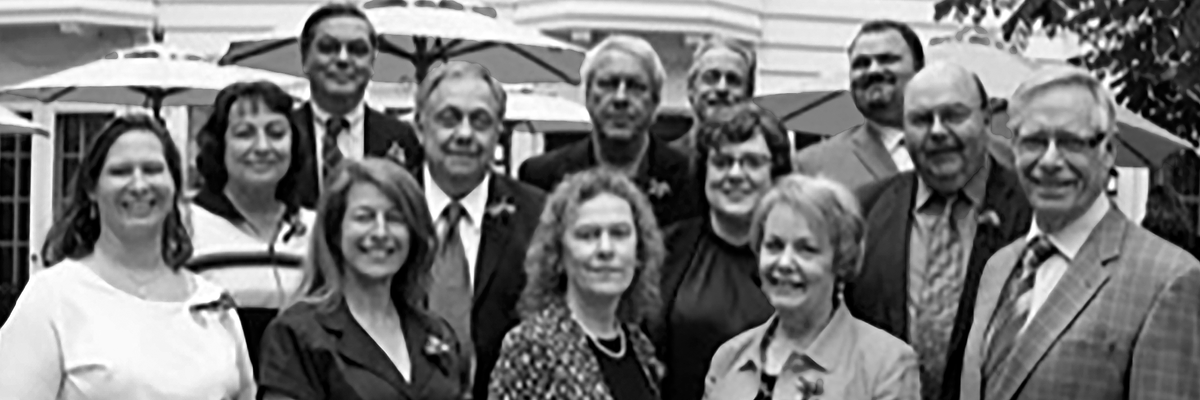
2009 Recipients of the President's Award for Outstanding Service, pictured with President Robert H. Bruininks.
Christopher Clark
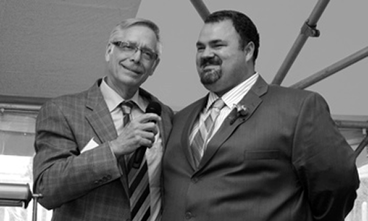
Christopher Clark, East Bank team 4 building and grounds worker, Facilities Management, is considered to be a key example of superior customer service mixed with an outstanding work ethic. He is responsible for the maintenance and upkeep of Folwell Hall, which is described as extraordinary. Because of his attention to detail and the great pride he takes in making sure that the appearance of Folwell Hall looks terrific, the morale of the occupants of Folwell Hall has improved significantly. He has demonstrated his consideration of others by making sure that floors are clear and dry for students who are blind and that the ramps are clear for individuals who need wheel chair access to the building. For example, after a staff member had foot surgery during the winter months, he made numerous efforts to clear the sidewalk when he knew this person would arrive and escort her from the curb to her office so she would not fall. He is ever vigilant in his efforts to ensure the safety of students, faculty, and staff who study, work, and teach in Folwell Hall and he is always willing to go the extra mile. One person wrote, "I cannot stress enough what an incredible difference his presence and work in Folwell have made. The service he is providing is truly exceptional and he is very deserving of the President's Award for Outstanding Service."
Arthur Erdman
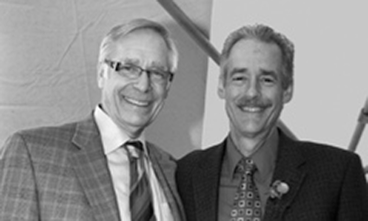
Arthur Erdman is the Richard C. Jordan Institute of Technology Distinguished Professor of Mechanical Engineering and a recipient of the Morse-Alumni Distinguished Teaching Award. He is also the director of the Medical Devices Center. He is credited with the success of the Design of Medical Device (DMD) Conference, a three-day conference that has grown to over 1,000 attendees annually, with the majority being from industry. He is one of the co-founding editors of the Journal of Medical Devices, which published the abstracts and papers from the DMD Conference. The impact of such activity is profound as it puts the University of Minnesota on the international map as one of the prominent academic institutions in the field of medical device design. His service to the University is impressive. As a member or a chair, he has served on dozens of governance committees, advisory committees, selection and search committees, and facility planning committees. He was a significant contributor as member of the TCF Bank Stadium planning committee. As co-chair of a subcommittee on the Campus Master Plan Task Force, he served as a staunch advocate for extending the Scholars Walk to the river and better use of the river edge. He also played a key role in making the University of Minnesota Boathouse a reality. He is known for his dedication and commitment to students and particularly to the concept of a world-class scholar-athlete at the University. He served as a resource teacher mentor for three years in the Early Career Faculty Learning Community Center, where he provided support for 36 junior faculty members annually to develop their full teaching potential while maintaining their role as scholars in a major research university. One person wrote, "Art is one of those rare faculty who not only contributes through his scholarship and teaching, but also through his exceptional service that has been critical to our department and to the University."
William Jacott

William Jacott, associate professor emeritus in the Department of Family Practice and Community Health, Medical School, is described as someone who exemplifies exceptional commitment to service to the University of Minnesota, the practice of medicine, and to the education of medical students and residents. Throughout his career, he has renovated the systems of medical education and medical practice to improve healthcare. His devotion to the University spans more than three decades, beginning with his founding leadership of the Family Medicine residency in Duluth. After spending 20 years in private practice in the Duluth area, where he helped to build the UMD Medical School and the Duluth Family Practice Residency, he returned to the Twin Cities as the assistant vice president of health sciences at the University of Minnesota. In his role as assistant vice president, he is credited with the creation of community and hospital affiliation agreements and he is known for his outstanding leadership as head of the Department of Family Practice and Community Health. Under his leadership, the department emerged as a national program with faculty recruitment, formation of increased community residency programs and family practice clinics, and the continued development of the Human Sexuality Program into one of national stature. He is also known for his leadership of UCare, which led to its growth as an excellent health care organization, especially for the elderly in Minnesota. He has also made outstanding contributions to the Minnesota Medical Association and the American Medical Association. One person wrote, "Dr. Jacott is an excellent example of exceptional service and dedication to the University. He has given far more than his time and energy; he has transformed individuals and organizations through his expertise, creativity, and coalition building. He exemplifies outstanding service."
Carol E. Kraus
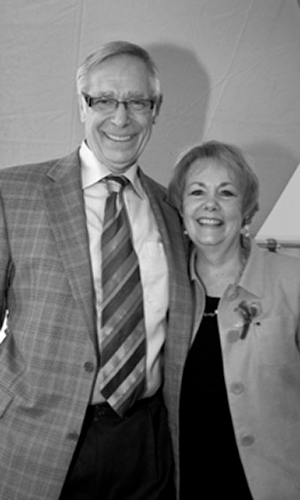
Carol E. Kraus is the senior administrative director in the Board of Regents Office. She has worked for the Board of Regents for 31 years. She has served as a mentor and an advisor to six executive directors and assisted 60 Regents and five presidents. She was instrumental in coordinating the relocation of the Board Office and served as the interim executive director, chosen by the Board of Regents, when the executive director was on medical leave. She is credited with leading the implementation planning efforts of the new PeopleSoft Enterprise Financial System for the Board Office. One person wrote, "Amazingly, she took this on while also performing her own duties and those of Ann Cieslak during Ann's leave. I was able to witness Carol's leadership within her own organization as the Board Office went through this very difficult time without compromising its service to the Board and the University community." Another person wrote, "With her high degree of personal integrity and dedication to serving the University of Minnesota, I believe there are few who can match Carol's level of commitment and service." She has, indeed, demonstrated exceptional service to the governing board and to the institution through her devotion and dedication.
MJ Leone
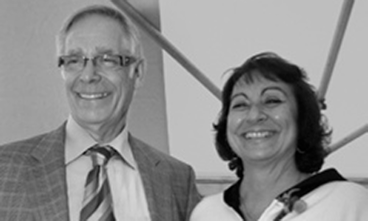
MJ Leone, executive office and administrative specialist in the Graduate School at the University of Minnesota Duluth (UMD), served the University for 34 years. Prior to her retirement in March 2009, she is credited with creating an international student and scholar services operation on the UMD campus, devising systems for tracking and troubleshooting student billing accounts and the graduate assistant insurance plan. In addition, she developed a separate graduate commencement ceremony, a series of online resources to assist in processing applications and admissions to UMD-based Graduate School programs, and she took the leadership role in the development of an on-site workshop for directors of graduate studies on the UMD campus. Because of her dedication and commitment, she went above and beyond her job description and volunteered to become the resident expert on many of the issues affecting international students. In doing so, she made a positive impact on literally thousands of international students and the program over the years. Her contributions to the creation of a separate graduate commencement ceremony are significant. Parents come from all over the world to attend this highly anticipated event and leave with the lasting image of their family's wonderful, memorable experience. One person wrote, "In so many cases, Ms. Leone's contributions were completely above and beyond the call of duty - not a part of her job description but rather a part of her commitment to making the graduate experience as smoothly functioning as possible. To thousands of UMD students, MJ Leone is the face of graduate education. She is the consummate professional. Her contributions are impossible to quantify, but the recognition of these accomplishments with a President's Award for Outstanding Service would be a fitting acknowledgement of her service."
Anissa Lightner

Anissa Lightner is the assistant director for student-athlete welfare in the McNamara Academic Center for Student-Athletes (MAC) at the University of Minnesota. For more than six years, she has worked in the area of NCAA CHAMPS/Life Skills (Challenging Athletes Minds for Personal Success) and student-athlete welfare. She has gone above and beyond her job duties by bringing in new ideas and programs to the NCAA CHAMPS/Life Skills program at the University of Minnesota. She is also credited with serving as an exemplary mentor and role model for the interns employed by the MAC. Some of the programs she has developed include the Young Professionals Dinner, Jobs and Internships, Resume Book, and Maroon and Gold Impacting the Community (MAGIC). Under her outstanding leadership, a partnership was developed with St. Jude's Medical Foundation. The Foundation generously donated a bus to support the MAGIC program, which provides student-athletes with quality outreach opportunities. The bus is used to take student-athletes into the community and to transport children to campus. She also has been instrumental in championing community campaigns such as Eat Smart, Play Hard, a program aimed at children to motivate them to exercise and eat healthy; and, Tobacco Free is the Way to Be, which sends student-athletes from the University to speak to groups of school children about the dangers of tobacco smoke and second-hand smoke. Over 500 student-athletes took part in the 300 community outreach activities organized by her and the teams. In addition, she led the athletics department's effort to honor and recognize the Native American communities during the month of November and Black History Month in February. One person wrote, "It is my hope that the President's Award Committee will realize the amazing contributions Anissa Lightner has brought to the University of Minnesota, the Twin Cities community and the lives of hundreds of Gopher student-athletes. I truly believe that Anissa embodies the spirit of this award due to her unbelievable commitment to service."
Judith A. Martin
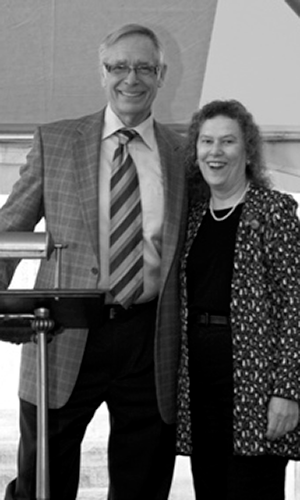
Judith A. Martin is a professor in the Department of Geography and director of the Urban Studies Program. One person wrote, "Judith Martin has parlayed her expertise in urban studies into a remarkable record of service to the University of Minnesota and its surrounding community. That record in turn parallels a record of significant contribution to the University governance in areas that do not draw directly on her professional expertise. The combination has been consequential for the University to a degree that is rare among U of M faculty." Described as "the complete University citizen," she has received prestigious teaching awards such as the Morse-Alumni Award for Contributions to Undergraduate Education, the College of Continuing Education 2005 Teaching Award, the Jerome Foundation Books Arts Award (with Rob Silberman in 1993), and she was named an Academic Fellow in the Scandinavian Urban Studies Program in 1997. In 1999, she received the University of Minnesota Community Service Award for her valued work with Twin Cities communities. She has been a tireless contributor to faculty governance at the University. Her service includes chair of the Senate Committee on Educational Policy (SCEP), chair of the Senate Committee on Finance and Planning (SCFP), co-chair of the Campus Master Planning Committee, and chair of the Senate and Faculty Consultative Committee (SCC/FCC). For more than twenty years, she has served as the director of the Urban Studies program. In addition, she has served on numerous department, college, university, and community search committees, advisory committees, planning committees and boards. During the University's conversion from quarters to semesters, she served as chair of SCEP, where she played a critical role in revising and creating policies on course contact hours and requirements. In her role as chair of the FCC (2003), she provided faculty leadership during challenging budget cuts and now in 2009, she is providing faculty leadership in her role as chair of the SCFP. She also serves on the Financing the Future Task Force. Another person wrote, "Throughout her distinguished career, she has demonstrated time and again that the best interests of the University of Minnesota and the greater Twin Cities are closest to her heart."
Patricia Neiman
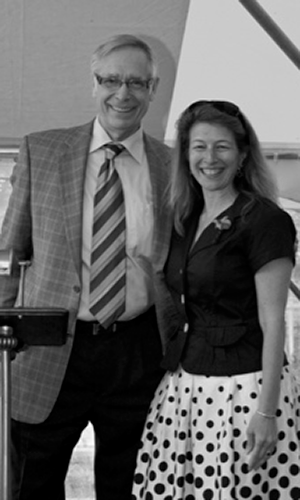
Patricia Neiman is a student development specialist in the Office of Equity and Diversity. Prior to accepting her position in the Office of Equity and Diversity, she held positions in the College of Education and Human Development and in the General College. For more than thirty years, she has demonstrated an extraordinary dedication to the University community through her work with marginalized students in the classroom; to becoming a highly sought after advisor, particularly to students of color, immigrants, and international students; to creating a model career services center utilized in two colleges; and finally to serving as a creative student development specialist. A common theme echoed by those who wrote letters of support is that what is most exceptional about her service is her ability to connect with people and help them to achieve their goals. She is described as compassionate, fervent, articulate, and deeply authentic about the multicultural issues that students confront in higher education. One of her outreach efforts brings middle school students from the Get Ready Program, an early intervention and college awareness program, to campus. This outreach makes an extraordinary impact on children who may not have had college exposure or are first generation college students from across the state and beyond. One person wrote, "Patti models the type of unconditional service that such students need and the advocacy they require. Our students that have worked with Patti uniformly praise her dedication, her persistence, her commitment, her steadfastness, and her infinite empathy for students. They are amazed by her energy. They are impressed by her leadership. They are awed by her evenhandedness toward all. But mostly, they just want to "be like Patti." In recognition of her outstanding contributions, she received the Alfred L. Vaughan Award for Outstanding Service to the General College and the prestigious university-wide Tate Excellence in Undergraduate Advising Award.
Gabriele Schmiegel

Gabriele Schmiegel is a counselor for International Student and Scholar Services (ISSS), Office of International Programs, where her primary role is advising and counseling international students and scholars. Her knowledge regarding the complex regulations and financial aid programs for international students is invaluable. Her compassion and dedication for these students and their families is unsurpassed. When an international student suffers an unforeseen setback such as serious illness, a parent's death, or economic disaster at home, she is always available. She is their advocate and has spent countless hours supporting them, even if it has meant long nights at the hospital. She has been a superb representative of the University at professional organizations such as NAFSA: Association of International Educators. She has served on several University committees such as the Senate Committee on Student Affairs, the Graduate Assistant Health Insurance Provider Selection Committee, and the University of Minnesota Graduate School Task Force on Living Expenses. She volunteered to coordinate the International Friendship Group program, which provides new international students with opportunities to develop friendships with students from other countries through intercultural learning and social activities. In January 2009, she was recognized by the Latin American Student Association for her service and received the Excellence in Student Service Award. One person wrote, "Gabi is extraordinary, and we're enormously fortunate to have her at the University of Minnesota. Her service is outstanding by every measure."
Benjamin G. Sharpe
Benjamin G. Sharpe is a senior academic advisor in the Office of Academic Advising in the Institute of Technology (IT). For more than 30 years, he has served the Institute of Technology and the University with dedication and distinction. During the reorganization of IT Student Services, he transitioned into a senior academic advisory position while maintaining his previous full-time position as IT transfer admissions coordinator. For more than a year, he assumed the responsibility of two positions. He is credited with building a database that provides course equivalencies that allow students to determine how their courses and credits transfer to the IT and how they meet degree requirements. He established equivalency tables for physical sciences, math and engineering courses for all colleges and universities in Minnesota, the upper Midwest, nationally and internationally. He is considered to be the catalyst in developing articulation agreements with several regional colleges and universities. He also played a key role in the development of dual degree programs, which includes more than 40 colleges and universities. He volunteered to serve as the IT Office of Academic Advising liaison for undergraduate student veterans and worked to educate IT staff on issues and concerns related to student veterans. One person wrote, "It is clearly evident that Ben Sharpe does not shy away from hard work, especially when the work is related to helping another. His service spreads across the globe and into the minds and hearts of students, families, and fellow colleagues. In addition, with every effort, Ben is a positive representation of the University of Minnesota and our dedication to student services."
Marvin L. Stein
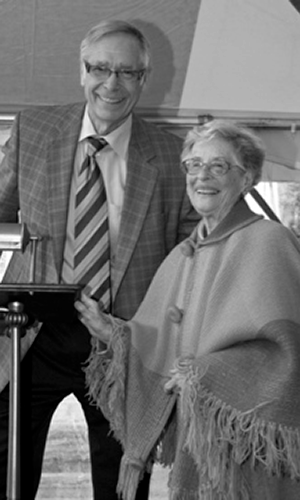
Marvin L. Stein, professor emeritus, Department of Computer Science in the Institute of Technology (IT), is affectionately referred to as "the father of Computer Science at the University of Minnesota." Upon his arrival in 1955 as an assistant professor in mathematics, he saw the need for computers and training in them. According to Professor Stein, there were only six computers in the country at that time and there were few classes on the subject. A true trailblazer, he was pivotal in the University securing 400 hours on an ERA 1103 computer. "The machine was about 60 feet long, weighed 17 tons, and was about 28 feet wide at its largest point," Stein said of the colossal computer. It was during his tenure as director of the Numerical Analysis Center that he lobbied for the University to acquire more time on computing equipment and to purchase its own computer, which it did in 1958. He then pushed the University in the forefront of new technology after he received a $500,000 grant from NSF and an appropriation from the legislature of $250,000. In 1967, his lobbying IT for an official program in computer science paid off and it became a reality. The first official academic year for the new Department of Computer Science was in 1970-1971. Professor Stein served as the founding department head the first year, but stepped down to serve as a professor until 1997, when he retired. It is because of visionaries such as Professor Stein that the Department of Computer Science is now a world-class department and has educated thousands of students. He received many honors and awards including the Guggenheim Fellowship for his role in the discovery of the conjugate gradient method and for being the principal inventor of the Stein-Pope division method and the Stein-Rose sorting algorithm. He is also a Fullbright award winner and the recipient of a George Taylor Award, which recognized his contributions to teaching at the University. One person wrote, "Marvin is not only a man of vision but an extremely loyal faculty member of the Department (which is extremely close to his heart) and the University of Minnesota. I cannot think of anyone I met during my tenure at the UMN who deserves this service award more than Marvin Stein."
Les Westendorp

Les Westendorp is the manager for the Research Animal Resources (RAR) in the Academic Health Center. For more than 35 years, he has served the University in his role in animal care and husbandry. He is credited with training new graduate students in biosecurity for conducting animal experiments, developing biosecurity policies for the infectious agents they use, and ensuring that the animals are comfortable, workers are safe, and the RAR facilities meet all standards. He is known for cultivating superb relations with faculty, students, and staff in various departments. For example, when isolators for poultry research were built in the College of Veterinary Medicine, he contributed a significant amount of time in their design and construction. One person wrote, "His customer service ethic has also been exemplary and brought many outside companies to the RAR/CVM facilities, enhancing our service to the business community while generating revenue that aids in cost control for university customers. " His abilities and knowledge include crop planting/rotation/sales at the Rosemount Farm, managing inventories of rodent caging for veterinary biomedical researchers, farm building design, waste gutter mechanics, inventory systems, and budget planning. He is described as a true Renaissance man in the field of animal care and use management.
Peter Zetterberg
Peter Zetterberg is a senior analyst in the Office of Undergraduate Education in the Office of the Senior Vice President for Academic Affairs and Provost. Over the course of 28 years, he worked in a variety of capacities at the University, playing an important role in decisions that have affected undergraduate education. He led the semester-conversion process and served as the director of the Office of Institutional Research and Reporting. He served as the lead University analyst on important projects such as tuition modeling, financial aid allocation and policy, human resource assessment, curricular review, and innumerable budget modeling initiatives. He is credited with the University's adoption of the Founder's Free Tuition Program. Known for his knowledge, skill, and responsiveness as well as his great sense of humor, he has done an outstanding job in showcasing the University of Minnesota at the legislature. He is routinely called upon to inform public policy decisions in higher education for the University and the state. Peter is described as one of the top sales people for the University and has, without a doubt, contributed significantly to improving the quality of education for students, enhancing the effectiveness of the curriculum and service to students, and to ensuring access to the University for students from families of modest financial means. One person wrote, "Peter Zetterberg loves the University of Minnesota. He cares about our ability to transform the lives of our students and create a better future for the world. He spends his life finding ways to support and improve its mission. There really is no one more deserving of this honor."